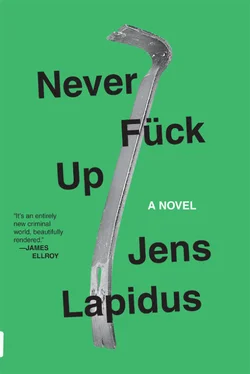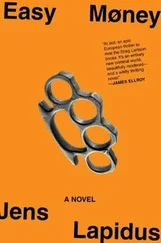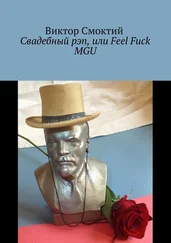He felt lost, and at the same time, superior. Most of the people in here were duds. According to Niklas, the logic was simple: that’s why people ended up in here.
He felt like the robot in the Terminator movies. Registered his surroundings, the rooms, the people, like a computer. Scanned the placement of the cells, the guards’ equipment, tones of voices, attitude. Possibilities. He was classified as restricted, so he wasn’t permitted to speak with anyone, to make or receive phone calls, or to send or receive mail. They thought he might tamper with evidence if he gained access to the outside world. It was insane.
He thought about the interrogations he’d been through. A few’d only been fifteen minutes long. Others several hours. The investigators went over the same things over and over again. When he’d arrived at Benjamin’s place on the night in question, where they’d rented the DVD, who’d paid for the movie, if he knew what Benjamin’d been doing earlier during the night, if he’d like to comment on his mother’s testimony, when he’d left Benjamin’s place for home, what his mother’d been doing when he got home. And, yesterday: they started asking questions about Mats Strömberg and Roger Jonsson. They were on to him.
They sat in a small interrogation room in the same hall as his cell. There was a sticker on the eternal linoleum floor that pointed out the direction of the Kaaba in Mecca—someone was apparently permitted to pray in there. There was an intercom phone on the table, but outbound calls were blocked. There was a note on the wall: Important! Contact unit personnel before the client is released into the hallway. He couldn’t complain about security. His overall conclusion: breaking out of the jail at Kronoberg wouldn’t be easy.
Today: another interrogation, even though there was nothing to say. He didn’t have anything to do with Claes’s murder, that’s all there was to it.
His lawyer sat with him for a few minutes before the interrogation.
“Have you thought of anything since the last time we saw each other? Anything you want to bring up with the interrogator?”
Niklas said what he was thinking. “I don’t want to talk about the way Claes treated Mom and me. That’s none of the police’s business.”
“Then I suggest that you breathe through your nose and keep your mouth shut,” Burtig said. “Do you understand? Legally, you don’t have to answer any questions about that.”
Niklas understood. Burtig was good, but would that be enough?
The chief interrogator, Stig Ronander, came in. Gray hair and a spider’s web of wrinkles around his eyes. The old guy exuded experience and calm: a relaxed style, composed movements. Above all: a gleam in his eye and a sense of humor that allowed the interrogations to be punctuated by a laugh now and then. It was smart, nasty smart.
The other cop was named Ingrid Johansson. She was the same age as Ronander, but more quiet, watchful, on her guard. She brought a tray with coffee and cinnamon buns.
Niklas’d spent a few hours in his cell trying to analyze their interrogation technique. It was significantly more subtle than his and Collin’s methods in the heat, down in the sand. An interpreter, the butt of a gun, a boot: that was usually enough to get the information you needed. Ronander/Johansson rocked the opposite style: pleasantness attack. Self-controlled and thoughtful, tried to create a connection, trust. Force more details out of him by asking the same things over and over again. Good cop/bad cop—seemed to belong to the old school. Both oozed trust, consideration. But Niklas was on to them. They were slippery.
The first real question came after ten minutes of coffee sipping and small talk. “You wouldn’t mind telling us about your childhood, would you? Your mom already has.”
“No comment.”
“Why no comment? Come on.”
“No comment.”
“But Niklas, be nice. We’re just talking here. Do you remember a lot from your childhood?”
Silence.
“Did you like sports?”
Silence.
“Did you used to play outdoors?”
Silence.
“Did you read books?”
Even more silence.
“Niklas, I understand if this is difficult to talk about. But it could be worth it, for your own sake.”
“I said, no comment.”
“Your mom worked as a cashier, right?”
Niklas drew a line through the crumbs on the table.
“That’s private.”
“But why is it private? She told us so herself. So it can’t be private.”
Silence.
“Is it true that she worked as a cashier?” Ronander’s eyes darted quickly to the right, toward Ingrid Johansson. Niklas didn’t respond.
And that’s how it went. Repetition, gentle questioning, repetition. The lawyer couldn’t do much, they had every right to ask questions. Two hours went by. More repetition. Wasted time. His childhood was an important subject, he’d give them that. But they didn’t know how important. They didn’t understand what ought to be done to stop people like Claes Rantzell.
He wasn’t guilty of this.
Only two days left till New Year’s Eve. Niklas thought about Mahmud and their preparations. Wondered if a haji like him would’ve gotten his shit done: the weapons, the foot soldiers, the bolt cutters. Niklas himself’d done everything before he was arrested. But now: time was running out. He hoped the Arab would sit tight on the gear for a later occasion.
He tried to work out in his cell. Push-ups, sit-ups, triceps exercises, back, legs, shoulders. He brainstormed, planned, organized. There had to be a solution. A way out. At night, other, darker thoughts visited him. The face of the prostitute. Images of how they would assault, beat, and rape her. Glimpses of her vulnerability: the girl crying in a bed, pleading for help. Where was help? Where was freedom? And other images: Nina Glavmo-Svensén in the idyllic suburb. The child on her arm. The locked doors of the house. He didn’t know if he was dreaming or imagining things.
It was almost time for another hearing. They’d already had two, without success. His lawyer, Burtig, explained, “First, they weren’t allowed to hold you for more than four days without the court making a decision about the charges brought against you. After that, they have to hold a hearing every other week in order to continue to coop you up like this. But I think we have a pretty good case. You have an alibi. There are no witnesses. No technical evidence so far; they haven’t found anything on you through the forensic lab database. The question is just what your mom is actually saying. And what they’ve found on your computer about those other guys.”
Niklas already knew what to answer: “I want a hearing. As soon as possible.”
The lawyer took notes.
Niklas had a plan.
* * *
THE NATIONAL POLICE
The National Bureau of Investigation’s Palme Group
Date: December 29 APAL—2478/07
MEMORANDUM
(Confidential according to Chapter 9 § 12 of the Secrecy Act)
Regarding the murder of Claes Rantzell (previous name: Claes Cederholm, Reg. nr 24.555)
The investigation of the murder of Claes Rantzell
The preliminary investigation of the murder of Claes Rantzell (previously named Claes Cederholm) is led by Detective Inspector Stig H. Ronander of the Southern District in Stockholm. Ronander is reporting personally to the Palme Group.
Fredrik Särholm, the Palme Group’s specially appointed investigator, as designated on September 12, has compiled a report regarding Rantzell (Attachment 1).
Читать дальше













